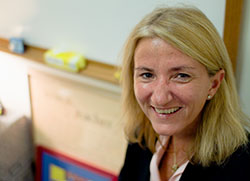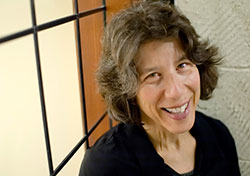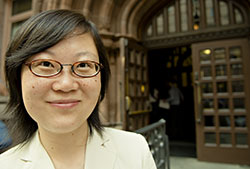New Faces
No stranger to TC - she's in her second year as a faculty advisor to the Cahn Fellows Distinguished New York City Principals program - Eleanor Drago-Severson joins the College from Harvard Graduate School of Education. For the past 8 years she has taught doctoral students about qualitative research methods and transformational learning. She describes the latter as a means of "increasing the actual cognitive complexity of someone's mind so he or she can better manage work and life," and says her work is inspired by "the idea that schools and other educational organizations need to be places where the adults as well as the children and youth are growing."
At TC, Drago-Severson will continue teaching qualitative research methodologies and also lead a course called Creating a Learning Community, in the fall, and the sequel, Transforming Schools and Transforming Education, in the spring. She's designing a new qualitative research course for doctoral students in the Inquiry Program and also will teach in TC's Summer Principals Academy.
Her Passion: "To shape, and help others shape, contexts in which adults can learn and grow. I am especially interested in supporting teachers, principals, parents and other adults, and in how that influences children and youth.
"What drew me to this work is that I had the luxury of working in a school where the faculty seemed to be well-supported and attended to. That seemed to have a direct impact on student learning and achievement. I also worked in a school where the faculty was not well-supported, and unfortunately that, too, was reflected in the children's achievement, well-being and happiness.
"I'm currently doing research on creating reflective practice groups for principals. Schools are like families, and I'm interested in how the principal acts as a key force in shaping a school climate in a way that can support adult and children's learning. Also, principals need to have colleagues to talk to. A research project I recently conducted showed that 23 out of 25 principals expressed that need. Yet only three were engaging in those kinds of groups."
Rachel L. Navarro, Assistant Professor of Psychology and Education in the Counseling Psychology Program
As part of the Department of Counseling and Clinical Psychology, Rachel Navarro will teach Psychological Assessment courses in the Counseling Psychology Program for both doctoral and masters students, including Assessment in Counseling and Assessment Practicum.
In addition to providing counseling services to women in racial, ethnic minorities and other underserved populations, Navarro has studied Mexican-American middle school students and the factors that influence their math and science academic and career goals. "I looked at personal, cultural and environmental influences on goals through the lens of social cognitive career theory," she says. In her research, social support and social class influenced students' academic achievement, which in turn affected their confidence in their math and science abilities. The more confident students are in their abilities and the more positive outcomes they anticipate from their academic work, the more likely student are to aspire to pursue academic work and other career goals in math and science fields.
Navarro also has worked in shelters and advocacy centers for women and their children who have experienced domestic or relationship violence. "I helped them find jobs, clothes, housing and cars in Minneapolis, where I am from originally," she says.
Her Passion: "Helping to provide more effective educational and psychological services to Latinos. Out of all Latino ethnic subgroups, Mexican-Americans have the lowest high school and college graduation rates." Navarro traces that trend directly to "the intergenerational cycle of low educational attainment, low-paying work and poverty in the Latino community" due to long-standing discrimination and oppression.
"As a member of the Latino culture, more specifically as a Puerto Rican, I want to provide a service to my community, which is underserved by educational and healthcare institutions," she says. "Here at TC I hope to be able to work with school systems and use research to develop intervention programs to help Latinos stay in school. I also want to study and build interventions that help promote positive psychological well-being in the Latino community."
Barbara Tversky, Professor of Psychology and Education in the Cognitive Studies in Education program
Barbara Tversky joins TC from Stanford University, where she was a Professor of Psychology. "A lot of what I've been doing is training people for basic psychology," she said. "In Silicon Valley it is a background that permeates everything, and many undergrads have gone into those companies." Here at TC, she is Professor of Psychology and Education in the Cognitive Studies in Education program. She is teaching classes on Spatial Thinking, including its relationship to language and math; Cognitive Psychology, which will cover standard material on perception, attention, memory, thinking, problem solving and decision making; and a possible course in Visual Communication, which includes the use of gesture.
"We find in many cases that gestures are superior to words and explanations," Tversky said. "They function in retrieving words, increasing spatial memory and structuring a problem. Just making gestures helps your thinking."
Tversky noted that her work on visualization and spatial thinking has allowed her to go into cross-disciplinary areas - doing work with hard scientists, architects and folks in the design world as well as with anthropologists, linguists, and philosophers interested in how people reason pictorially through images.
Her Passion: "There were lots of artists in my family. I grew up attuned to that world. I like finding out about how people think about space and organize it around elements and spatial relations. Every spatial situation has a different set of elements that are important and a frame of reference. We find that both the selection of landmarks and reference frames distort the memory. For example, people think Philadelphia is north of Rome because they think of the U.S. and Europe as big blobs on the same level. Europe is north of the U.S.
"I'm also passionate about going from the theoretical to the applied which we all do for events that take place in time- such as making a bed, or understanding how salt dissolves or how to put a piece of furniture together. And then, learning how people understand those situations and principles to create better explanations of situations. Besides growing students, that is the thrill to me- all this interdisciplinary contact where I learn so much."
Ye (Angel) Wang, Assistant Professor of Education in the Deaf and Hard of Hearing Program
"I became involved in deaf education because both my parents are deaf - my father was born deaf and never went to school and my mother became deaf at 12 years old, and she was the first deaf person in my hometown to go to college," says Angel Wang, who joins TC's Department of Health and Behavior Studies from Ohio State University (OSU), where she was a recent Ph.D. graduate in Deaf Education. "When I was a senior in college - I had gone to the top law school in Beijing at my teacher's recommendation, even though I had wanted to teach - people from Gallaudet University, the leading U.S. college for students who are deaf or hard of hearing, came to China for a conference, which my mother attended. None of the Chinese sign language interpreters knew English. They asked me to go to the conference to be the interpreter, where I translated spoken Chinese into signed Chinese and spoken English.
>Wang is interested in the use of technology to promote literacy development in students who are deaf or hard of hearing. She also explores technology to develop lesson plans for teachers to use in their classrooms. While at OSU, she obtained funding from the Department of Education and PBS to develop "Cornerstones," a project that uses videos to translate printed stories into American Sign Language (ASL), Signed English or cued speech. (ASL and Signed English employ different grammar, she explains.) The lesson plans are posted on the PBS Kids Web site and shown on Between the Lines on PBS channels.
In another project, "Edited Captions," Wang and her colleagues compared the impact of verbatim captioning and edited captioning on the comprehension of young television viewers. Verbatim captions are word-for-word captions that are produced quickly and often provide "too much information," Wang says. Edited captioning provides a simplified version of what is happening on the screen.
"Kids watch a lot of TV and use verbatim captioning. Using it for literacy development could be a good possibility," Wang says. "It connects what students do at home to the classroom." However, edited captioning is easier for students to understand and has a better effect on their reading abilities, she says.
Her Passion: "I am very interested in developing literacy skills in students who are deaf or hard of hearing, since surveys and assessments show that 90 percent of these students only read at the third or fourth-grade level after graduating from high school. Their hearing impairment obviously has a lot of influence on their literacy rates, and they are not receiving the same amount of information that other people do.
"My interest in equity and diversity relates to the fact that people normally use these terms when referring to race and gender. One piece that is forgotten is related to people's physical abilities, and that needs to be included in this picture as well."
Published Tuesday, Oct. 11, 2005



